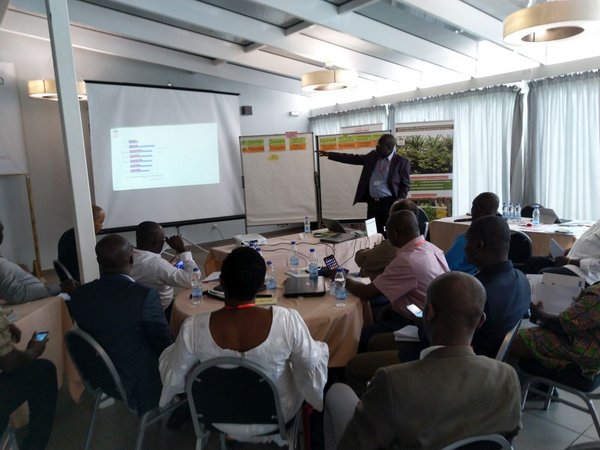- Share this article
- Subscribe to our newsletter
First African Cocoa Platform Conference
Yet another new initiative in the cocoa sector? This may have been the initial sceptical reaction of many observers in the run-up to the first African Cocoa Platform Conference from 19-21 November in Abidjan, Côte d’Ivoire. However, by the end the 70 participants from six African cocoa producer countries were largely united. A representative of the Cocoa and Coffee Interprofessional Council (CICC), Omer Maledy from Cameroon put it in a nutshell: ‘We African actors can use the Cocoa Platform as a vehicle for closer and cross-border cooperation between the institutions. We now have a playing field which we can approach as designers.’
In the past there has been virtually no multinational and thematically broad format for sharing knowledge and experience in the cocoa sector. The Cocoa Platform is now closing this gap. Faced by the current development policy problems in the cocoa producing nations in West and Central Africa, the platform is adopting existing approaches in various thematic areas. These include specifically successful measures to increase cocoa farmer incomes, functioning models of agro-ecological cocoa farming systems, increasing added value for local cocoa products in local markets, and improving the organisation and services of producer organisations and small businesses.
The African Cocoa Platform Conference was the first meeting on this scale. It was held at the invitation of the GIZ, with participants from the private sector, state institutions, research, farmers’ organisations, associations and civil society. The three-day conference programme was varied, with interactive papers on the ‘exchange market’, practical exchanges during field visits to cooperatives and cocoa processors, and planning cross-border activities in three working groups.
By the end of the conference there were many concrete and structured proposals which the technical working groups plan to implement in 2020. These include, for example, formulating common best practices for cocoa-based agroforestry systems and reafforestation approaches, advising on business and marketing models for local cocoa product processors, forming an alliance of cooperatives for improved technical exchanges in the fields of management, structuring and services, a presence at the African Cocoa and Chocolate Expo in Accra, and a listing of digital financing and consulting tools.
The Cocoa Platform as an accelerator for regional exchanges in the cocoa sector
Proposals for making the Cocoa Platform a permanent feature were put forward by Alain Sy Traoré, Director in charge of Agriculture and Rural Development at ECOWAS, who sees the platform as an accelerator for regional exchanges in the cocoa sector, in order to bring the theme under the ECOWAS umbrella in due course. Several francophone participants mentioned the Cocoa Producers’ Alliance (COPAL) as a possible future parent organisation, if current attempts to revive this succeed. There is the possibility of linking to national cocoa platforms which have been active for several years in the Côte d’Ivoire and Ghana. Discussions on this will continue in the coming year.
Role of the Green Innovation Centres
Through the programme Green Innovation Centres for the Agriculture and Food Sector (GIC) commissioned by the German Federal Ministry for Economic Cooperation and Development (BMZ), GIZ is financing the activities of the African Cocoa Platform in order to improve the knowledge systems of and cooperation between institutions of cocoa-farming countries in Africa. The Program Sustainable supply chains and standards hosts the Secretariat through its component ‘International dialogue for sustainable cocoa’. Its impacts are achieved in direct cooperation with the GIC country packages in Côte d’Ivoire and Cameroon, and also in coordination with activities of the German Initiative on Sustainable Cocoa (GISCO) and other German development cooperation GIZ projects.
Authors:
Arne Schuffenhauer and Martina Gaebler
Deutsche Gesellschaft für internationale Zusammenarbeit (giz) GmbH, Bonn, Germany
Contact: arne.schuffenhauer(at)giz.de
More information:
GIZ website – Program Sustainable supply chains and standards
GIZ website – Green Innovation Centres for the Agriculture and Food Sector





Add a comment
Comments :